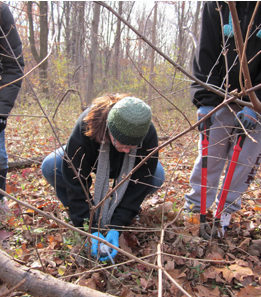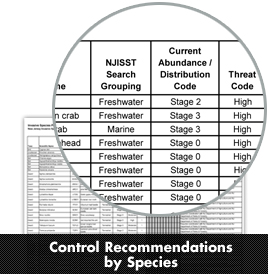Eradication
One of the main goals of the Strike Team is not only to detect and track the location of emerging invasive species but to stop them in their tracks! This is accomplished through extensive partnerships, as well as the use of trained seasonal field stewards, which assist partners in eradication of target species.
In order to improve stewardship practices related to invasive species, the Strike Team gathers information on best management practices for each of our target species. This information is updated each year based on our experiences and those shared with use by partners in New Jersey and the surrounding region. We strongly encourage our partners to share information on their experiences, both on strategy and specific herbicides that worked well or didn’t work at all. Please email such information to our Science Director.
Plant Eradication
The Strike Team employs 2 control methods when eradicating an infestation of invasive plants. Mechanical control is any control performed by hand. Specific strategies including pulling, mowing, cutting or girdling. Chemical control is any control performed through the use of herbicides. Chemical strategies commonly used by the Strike Team are basal bark and foliar spray. There is also the option to use a combination of mechanical & chemical control, such as cutting a plant to the stump and then applying herbicide. This strategy is called cut-stump.
The Strike Team encourages any individual applying herbicide to fully understand the appropriate strategies and safety recommendations, both to protect the health of the applicator and the integrity of the environment. We provide training workshops and on-the-ground training to all members.
Animal & Pathogen Control
The Strike Team partners with various organizations who focus on control or eradication of animals (including insects) and pathogens. Please contact us directly if you want to report an observation of or get involved in the control of these species. Thank you!
NOTE: The application of pesticides is regulated by the NJ Department of Environmental Protection – Pesticide Control Program (PCP). Visit their website for information on obtaining a pesticide license & regulation information regarding herbicide application in NJ. Those involved with the application of herbicides should become ‘commercial pesticide applicators’ or ‘certified pesticide operators’. In the case of herbicide application to wetland or open water, the DEP requires a permit.
PCP also requires precise record keeping of all herbicide applications (click for sample). Disposal of used herbicide containers requires a triple rinsing of the container followed by puncturing several holes in the container bottom to prevent unauthorized reuse. (Note: Containers are often made of plastic that can be recycled, provided that a triple rinse has been performed. Check with your county for more information.)


For a full explanation of control categories and their specific strategies, please see the following:
- Invasive Plant – Control Categories
- Invasive Plant – Eradication Strategies
- Invasive Plant – Attribute Summary
Resources:
